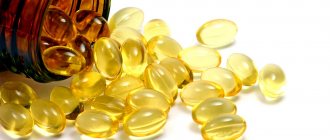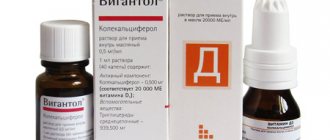Should you take fish oil?
It is useful to take fish oil for the following conditions:
- lack of vitamins A and D in the body;
- acute and chronic respiratory diseases;
- various eye diseases;
- wounds, injuries, bone fractures;
- problems with the growth of bones and teeth;
- dry skin and mucous membranes;
- poor condition of hair and nails.
The medicine can also be taken to prevent vascular diseases and rickets.
Popular pharmaceutical drugs
High-quality fish oil says “medical grade.” Avoid bottles labeled "food grade". Check the expiration date before purchasing.
The table shows the most popular drugs.
| Biocontour | Dietary supplement, release form – gelatin capsules. For children - chewable ones with flavoring additives. | The average price is 64 rubles per 100 capsules. |
| Kusalochka | Chewable capsules with flavors for children. | 150 rubles for 60 capsules. |
| Tula | Liquid preparation. | 150 rubles per 100 ml. |
When purchasing, ask for a product certificate. It indicates the type of fish from which the fish oil is obtained and the production time.
How to use
Oil
Intended for internal use during meals.
For an adult, it is enough to take 1 tbsp per day. l. For children, the dosage is determined by the doctor and depends on age.
Features of administration depend on the purposes for which the medicine is taken, as well as on medical indications.
Capsules
The drug in capsule form should be taken after meals and washed down with a sufficient amount of drinking water. The capsule must be swallowed immediately. You can take up to 6 capsules per day.
The duration of treatment is determined by a specialist and cannot exceed 1 month.
The method of use and dosage may vary among different manufacturers.
Contraindications
Despite the usefulness of fish oil, it has a number of contraindications:
- increased susceptibility to constituent components;
- hemophilia;
- low blood clotting rate;
- open pulmonary tuberculosis;
- excessive calcium levels in blood plasma;
- excessive levels of vitamins A and D in the body.
Relative contraindications include: ulcers, acute and chronic nephritis, breastfeeding, liver and kidney pathologies, heart disease, old age.
Children can be given oil from 3 months. Capsules are contraindicated in children under 7 years of age.
Features of assimilation
PUFAs entering the body are absorbed in the intestines, where they enter the blood through the walls of capillaries. With it, they are transported into the portal vein and thus end up in the systemic circulation, where they are bound by lipoproteins and albumin and in this form are transported to the cells. Their receptors recognize PUFAs and allow them to penetrate inside, where they are immediately captured by cell transport proteins. They ensure their delivery to the sites of cell membrane synthesis. As a result, Omega-3 is integrated into its composition and ensures proper functioning.
But not all molecules are equally fully absorbed in the intestines, and therefore reach their destinations. Triglycerides of PUFAs are most fully absorbed, since this is the natural form of Omega-3 for which the human body is prepared by nature. Concentrates obtained in laboratory conditions, in which fatty acids are separated from the glycerol stem, have significantly lower bioavailability, since the body does not fully recognize them, and therefore cannot use them. Therefore, the benefits of such food additives are quite low.
Adverse reactions and overdose
If you keep the dose and follow the established dosage regimen, then no negative reactions should appear. Otherwise, an upset stomach, an allergic reaction, and bad breath may occur.
With prolonged use, an overdose may occur, manifested by the following symptoms:
- lack of appetite;
- gagging;
- lethargic and drowsy state;
- stomach upset;
- headache.
If such symptoms appear, maintenance therapy should be started. You should stop taking the drug.
Should children be given fish oil?
For children under 2 years of age, the medicine is usually prescribed to prevent rickets. It contains vitamin D, which is necessary for bone growth and a strong immune system. This vitamin is useful in that it reduces the body's susceptibility to heart pathologies and skin diseases. It normalizes heart rate, maintains blood pressure at the desired level, and promotes the development of intellectual abilities.
After taking it, overly active children become more perseverant and calm, they can be better controlled, and they become less irritable.
To make it easier for young children to take the drug, it is produced in the form of capsules that do not have a specific odor and have a pleasant taste.
The instructions say that the oil can be given to babies from 3 months, and capsules can be taken from 6 years.
Doctors advise giving the medicine to those children whose immunity is very weakened. It will also be useful for diseases that occur with complications.
The benefits and harms of fish oil
Beneficial properties of fish oil:
- can lower blood pressure;
- reduces the likelihood of developing diabetes;
- helps cope with stressful situations and depression;
- slows down the development of malignant tumors;
- nourishes tissues with useful elements;
- activates brain activity.
Harm of fish oil:
- is a strong allergen;
- has contraindications;
- taking on an empty stomach may cause stomach upset;
- high calorie content.
The benefits of fish oil capsules
Capsules prevent the substance from oxidizing, suppress unpleasant taste and aroma, but the composition is no different from a liquid product for internal use. The composition also contains many beneficial vitamins and minerals.
What is Omega-3
The concept of Omega-3 refers to a complex of alpha-linolenic, eicosapentaenoic (EPA) and docosahexaenoic (DHA) polyunsaturated fatty acids, which are necessary for the body to carry out a number of biochemical processes correctly, but are not synthesized within itself. Therefore, in order to ensure the proper functioning of a large number of organs, in the regulation of which these unsaturated acids are involved, it is necessary to ensure a constant supply of the entire Omega-3 complex to the body with food.
Its sources are:
- sardine, mackerel, herring, halibut, trout, chum salmon and other fatty fish, but only of wild origin (Omega-3 accumulates only in fish that feed on plankton, and not feed);
- Cod liver;
- seafood;
- linseed, sea buckthorn, mustard oil;
- beef, offal;
- egg yolks;
- pumpkin, sunflower, flax seeds;
- mint, spinach, lettuce, pumpkin, asparagus, sorrel, broccoli;
- legumes
But in practice, even ardent adherents of the Mediterranean diet fail to obtain the required amount of Omega-3 from the food they consume every day. The problem of getting Omega-3 into the body becomes especially acute for vegetarians, since the largest amount of these important polyunsaturated fatty acids is found in marine fish and seafood.
Therefore, today most doctors agree that every person, including children, needs to use special dietary supplements to ensure the proper functioning of the body. But the Omega-3 complex is involved in the work:
- heart and blood vessels;
- brain;
- retina;
- musculoskeletal system;
- immune system;
- genitals;
- skin.
Therefore, with a long-term persistent lack of Omega-3 in the body, there is a high risk of developing atherosclerosis, stroke, heart attack, vision impairment and endocrine disorders.
Omega-3 and Omega-6 should not be confused. The latter complex of unsaturated fatty acids is also important for the body, but their deficiency is rare. This is due to the fact that sources of Omega-6 are oatmeal, poultry, and vegetable oils, which are present in the daily diet of the vast majority of people. If you additionally take Omega-6 in increased dosages, this can lead to an overdose and provoke an exacerbation of chronic inflammatory processes or create the preconditions for the development of new ones.
Benefits of Omega-3 for the body
Taking Omega-3 in individually selected doses allows you to achieve a lot of positive changes in the body’s condition and get rid of a number of problems, many of which we are accustomed to consider inevitable, namely:
- accelerate the removal of metabolic products, harmful compounds, free radicals and decay products, which improves performance, gives lightness and reduces the likelihood of developing cancer;
- speed up the process of muscle recovery after training, building muscle mass and burning excess fat tissue;
- reduce the sensitivity of the intestines to irritating factors, which improves digestion and eliminates the problem of constipation, diarrhea, irritable bowel syndrome;
- normalize the menstrual cycle, improve the quality and motility of sperm, which makes it possible to achieve pregnancy faster, which is important for problems with conception, and also helps reduce the risk of developing benign prostatic hyperplasia;
- cleanse the walls of blood vessels from harmful cholesterol, increase their elasticity, normalize blood pressure levels and improve the functioning of the cardiovascular system as a whole, which sharply reduces the likelihood of vascular accidents, i.e. strokes, heart attacks;
- increase cognitive abilities (thinking, memory, attention) by normalizing the functioning of the central nervous system, since a third of all fats needed by the brain are EPA and DHA;
- strengthen the immune system and reduce the number of transmitted viral diseases by strengthening cell membranes, increasing the activity of leukocytes and creating protection for the respiratory tract from the penetration of viruses and bacteria;
- increase stress resistance and improve psycho-emotional state by activating the production of serotonin, also called the hormone of joy;
- improve the condition of the skin by increasing the amount of synthesized collagen and improving its quality, which allows you to maintain the elasticity and youth of the skin longer.
It is very important for pregnant and lactating women to take Omega-3, as these substances are directly involved in the formation of the brain and nervous system of the fetus, as well as in its overall development.
In addition, Omega-3 has anti-inflammatory properties and accelerates tissue regeneration processes. Therefore, it is especially necessary in increased quantities for various inflammatory diseases, as well as any degenerative changes in the body. We must not forget about the fact that the condition of the skin largely depends on Omega-3. Therefore, maintaining a normal level of these polyunsaturated fatty acids helps to significantly slow down the aging process and improve skin color and smooth out fine wrinkles.
Reception features
The daily dose for an adult is considered to be 2 g of Omega-3, and for children 4-10 years old - 0.9 g. In some cases and only after testing, this dose can be increased, but in any situation it cannot exceed 8 g per day . To provide the adult body with this amount of these polyunsaturated fatty acids, it is necessary to eat fish 4-5 times a week. In practice, this is difficult to implement, since fatty fish, firstly, is not affordable for everyone, and secondly, consuming it in such quantities can lead to excess weight gain with an insufficient level of physical activity.
Therefore, for many, the solution is to take dietary supplements with Omega-3. But before you start using them on a regular basis, you should make sure that there are no contraindications, namely:
- allergies;
- kidney diseases, especially urolithiasis in the acute stage;
- elevated calcium levels;
- pathologies of the thyroid gland;
- tuberculosis.
Omega-3 preparations are poorly accepted by the body in case of chronic constipation and flatulence.
If there are no contraindications and the amount of Omega-3 required to cover all the body’s needs has been accurately established, the chosen remedy should be taken only during or after meals. When consumed on an empty stomach, it can cause problems with the intestines and stomach.











